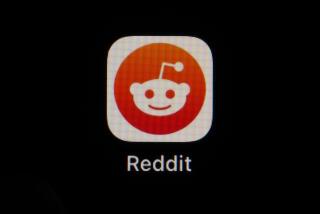Zynga files long-awaited IPO plan
- Share via
Zynga Inc.’s bid to cash in on Wall Street’s voracious appetite for Internet stocks comes with a tantalizing prospect — a highly profitable online game business.
The social gaming juggernaut hopes to raise $1 billion in an initial public offering of its stock, according to its filing with the Securities and Exchange Commission on Friday. That would value the creator of FarmVille, CityVille and other popular games on Facebook at about $10 billion.
Zynga’s filing follows stock offerings from a cluster of Internet companies, including Pandora Media Inc., LinkedIn Corp. and Demand Media Inc., whose lofty debut prices were reminiscent of the 1990s technology bubble.
Pandora, the latest to go public, was initially priced at $16 on June 14 but plummeted to $12.94 by June 17 on concerns over the Internet radio company’s prospects for becoming profitable. Its shares have since recovered, closing at $20.04 on Friday.
Four-year-old San Francisco-based Zynga boasts more than 148 million players in 166 countries who have fired up one of its 57 games at least once in the last month, according to the company’s documents.
AppData, an independent firm that tracks Facebook applications, estimated Zynga’s active monthly users at 271.9 million. People typically play more than one game a month; AppData counts the same person separately for each game played.
Zynga, in its filings, did not disclose a share price or a date when it expects to begin offering its stock. But many will be watching to see whether the company will price its shares aggressively, as Pandora did, or will take a more cautious approach.
“Bankers are very aware of the Pandora fiasco and would not like to see a repeat of that,” said Nitsan Hargil, senior analyst with GreenCrest Capital Management in New York. “They are likely to price Zynga much more conservatively.”
Zynga differs from Pandora in one key respect. Whereas Pandora has always operated at a loss, Zynga boasted a 21% operating profit. In its latest fiscal year ended Dec. 31, Zynga reported net income of $90.6million on $597.5 million in revenue.
“They’re delivering a lot of profit to the bottom line,” said veteran game industry analyst Michael Pachter of Wedbush Securities. “That’s what most people will look at.”
But some analysts say Wall Street projections that the offering could raise as much as $2 billion — which would value the company at $20 — as “overly optimistic.”
“Zynga didn’t evidence significant growth in users from 2010 to 2011, which suggests the possibility of saturation, at least in the U.S. on Facebook,” said Billy Pidgeon, analyst with M2 Research in New York. “The question is whether they can grow by expanding internationally, or on other platforms, such as mobile.”
Launched in 2007 by Silicon Valley serial entrepreneur Mark Pincus, Zynga has built an empire out of selling virtual goods for its games. It also reaps revenue from selling advertising and sponsorships within its popular games.
“We founded Zynga … with the mission of connecting the world through games,” Pincus wrote in a note to investors. “We believed play — like search, share and shop — would become one of the core activities on the Internet.”
Named after Pincus’ late French bulldog Zynga, the company amassed $845 million in funding from high-profile investors such as Kleiner Perkins Caufield & Byers, Avalon Ventures, Foundry Group, Softbank and Andreessen Horowitz. Private investors include MTV founder Bob Pittman, LinkedIn Chairman Reid Hoffman and Clarium Capital Chairman Peter Thiel.
In the coming weeks, Zynga executives are expected to prove why it may be worth that or more to prospective buyers.
Among the concerns likely to be raised is Zynga’s reliance on Facebook for the lion’s share of its business — a risk the game developer acknowledges in its filing, noting that “we generate substantially all of our revenue and players through the Facebook platform.”
While the social network provides access to an audience of 600 million to 700 million users, Facebook also limits ways developers such as Zynga can recruit new players — tactics that some derisively have called SpamVille because of the aggressive marketing involved.
“In general, Facebook has made it harder for apps to be overly aggressive in spreading content,” said Justin Smith, founder of Inside Network, a market research firm in Palo Alto, focused on Facebook apps. “That has made it harder for games to grow.”
Facebook also extracts a 30% fee on virtual items sold from apps on its platform, which cuts directly into developers’ revenue.
To lessen its dependence on Facebook, Zynga has launched two of its games, CityVille and FarmVille, on Apple Inc.’s iPhone and iPad. It also operates games on Yahoo.
But analysts remain skeptical.
“Their attempts to expand beyond the Facebook platform have not panned out thus far,” Hargil said.
Zynga disclosed to potential investors that as people increasingly access the Internet through smartphones, tablets and televisions — which are less powerful and have less capacity than computers — they may find the games it develops for these devices less compelling.
Moreover, social gaming is a new, fast-changing segment of the interactive entertainment world, and Zynga plans to continue investing significant resources to enhance its existing games and introduce new ones to hold players’ interest. A passionate core of gamers accounts for nearly all of its revenue.
For Zynga, growth could be an issue, because some believe the firm is starting to saturate the available audience on Facebook.
“Zynga is the largest developer on the platform by far,” Smith said. “The last couple of times they’ve launched new games, they regularly achieve 100 million active users. With 600 million people on Facebook, it makes sense that there’s some natural saturation point.”
More to Read
The biggest entertainment stories
Get our big stories about Hollywood, film, television, music, arts, culture and more right in your inbox as soon as they publish.
You may occasionally receive promotional content from the Los Angeles Times.










